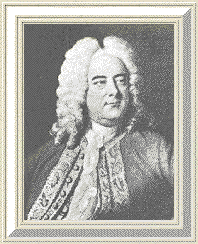 Handel
was born in Halle, eighty-five miles southwest of Berlin. His
father, a
wealthy barber who worked for the Duke of Saxony, wanted George
Frederich
to become a lawyer; the boy, showing enough musical aptitude to
master
several instruments and compose pieces in various styles at a young
age,
nevertheless entered the University of Halle
at
the
age of seventeen to study the law. This filial accomodation
ended
quickly; within a year, Handel had departed
the
University
to study music in Hamburg.
Handel
was born in Halle, eighty-five miles southwest of Berlin. His
father, a
wealthy barber who worked for the Duke of Saxony, wanted George
Frederich
to become a lawyer; the boy, showing enough musical aptitude to
master
several instruments and compose pieces in various styles at a young
age,
nevertheless entered the University of Halle
at
the
age of seventeen to study the law. This filial accomodation
ended
quickly; within a year, Handel had departed
the
University
to study music in Hamburg.
In Hamburg, young Handel got a job as a violinist in a theatre orchestra, and immediately set himself to learning the skills necessary to write opera - the most popular musical genre of the day. He produced his first operatic composition a year later - in 1704 - and it met with moderate success, which encouraged him to redouble his efforts. After writing three more operas in quick succession, Handel decided to further his education in the center of operatic culture - Italy.
Thus began a brilliant career as a composer of opera, vocal music and instrumental works. Handel was embraced by Italian nobility and cultural elite; his operas ("Rodrigo", 1708 and "Agrippina", 1709) and oratorios ("La resurrezione", 1708 and "Il Trionfe del tempo e del disinganno", 1708) showed him to be a composer of the first rank. He was quickly promoted to the position of Musical Director at the Electoral Court of Hanover, Germany, and had been at this post only a short time when he was compelled to travel to London, which was - and still is - a great opera center. His first visit to London was successful, on the strength of his opera "Rinaldo"; when Handel asked permission from the Hanover court to return to England in 1712, the favor was granted, and he would subsequently settle in England for good.
In England, Handel continued to compose operas in the light Italian vein, and he even tried to start opera companies on a number of occasions - although these attempts to become a music executive failed miserably. Contributing to this failure was the gradual decline in popularity of Italian opera in England; oratorios become the preferred taste, and Handel accordingly wrote his first English oratorio in 1720. He would pursue this musical form for several decades; "Saul and Israel in Egypt" was a big success in 1739, and the legendary "Messiah" was completed to popular acclaim in 1742. The success of these projects brought Handel fame not only among the gentry of England, but just as importantly among the middle class.
Handel's stature grew, and he rose to a position of the highest eminence in the musical world. He became independently wealthy, and enjoyed the generous patronage of both King George I and King George II during his lifetime. His oratorios were the toast of the country, and of the continent as well. His overtures and instrumental music - "Water Music" and "Royal Fireworks Music" are the most famous - were instant classics, and continue to inspire music lovers today.
Handel died in London in 1759. He was buried at Westminster Abbey with full state honors. The last music he heard in performance was his own "Messiah".
(See also The Operas of Handel, The Oratorios of Handel and Handel's Water Music)